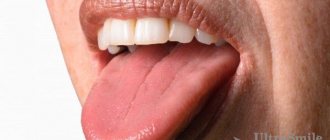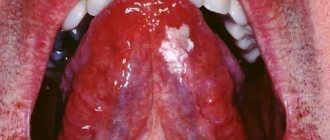We are used to the fact that we need to go to the dentist if we have problems with our teeth or gums. What to do if you have inflammation of the tongue or glossitis? Dentists identify more than 10 types and subtypes of infection. The infection can be caused by both fungus and bacteria. Viral infection is less common. Inflammation can be caused by a lack of certain vitamins and minerals, or hormonal changes. There are many reasons for the disease, so it is important to identify what exactly caused the inflammatory process.
Causes of glossitis
- improper oral hygiene;
- bacterial infection;
- fungal infection;
- heavy metal poisoning;
- bad habits (smoking, alcoholism);
- congenital pathologies of the tongue (folded tongue);
- allergic reaction;
- tongue injury (often caused by malocclusion);
- oral infections;
- lack of iron in the body;
- burn of the mucous membrane (hot food or drinks);
- infectious diseases (AIDS, tuberculosis, scarlet fever, measles).
Inflammatory diseases
In the human oral cavity, there is lymphoid tissue that protects against the entry of microorganisms into the respiratory and digestive tract. When the palatine and lingual tonsils become inflamed, the following symptoms are observed:
- Severe weakness and fever.
- Painful sensations when swallowing.
- Swelling of the tonsils and root of the tongue.
- The appearance of plaque.
Sore throat - the cause of pain in the root of the tongue
Almost every one of us, at least once in our lives, has experienced problems associated with various inflammatory processes, such as the tissues of the tongue, pharynx or larynx. Only a specialist with knowledge in the field of modern medicine can identify where exactly the organ is affected and why this happened.
A person faced with such a problem should pay attention to symptoms such as:
- The slightest increase in body temperature, loss of appetite, asthenic syndrome.
- Pain while chewing and swallowing food.
- Cough accompanied by hoarseness and runny nose (rhinitis).
Inflammatory throat diseases are the most common
At the first signs of the disease, you should not resort to traditional medicine, since self-medication can lead to a lot of health problems. If you do not start treating the disease in time, it is quite possible that a sore throat will develop.
An inflammatory disease close to glossitis and has the following symptoms:
- Salivation.
- The taste of food is not felt and the tongue goes numb.
- Discomfort in the oral cavity both when eating and talking.
- Soreness and redness of the tongue.
Glossitis - inflammation of the tongue
Ulcers on the root of the tongue due to HIV
The most common ones include:
- smoking;
- eating too spicy food and hot drinks;
- work in hazardous conditions;
- consumption of various acids and alkalis;
- injury to the tongue due to low-quality dental supplies.
Herpes on the root of the tongue
Prolonged exposure to the above damage can cause irreparable harm to human health. When drinking hot drinks once, the burn will be insignificant, but if you drink them often, the lesions will be extensive.
Tongue burn causes severe pain
The person experiences:
- Soreness at the base of the throat and tongue, aggravated by eating food.
- Unpleasant odor from the mouth.
- The tongue changes color and shape.
Treatment of this problem is carried out with the help of dietary nutrition. Locally, the oral cavity must be treated with solutions that can effectively heal wounds.
Such symptoms are compared with the presence of a foreign body in the oral cavity.
A timely visit to the doctor can prevent such a serious disease and preserve the patient’s quality of life. Treatment includes the use of modern methods.
Each disease that is associated with painful symptoms on the tongue can be diagnosed based on specific signs. The quality of all treatment depends on correct and accurate diagnosis. Let us consider in more detail possible diseases of the tongue, inflammation in the throat and tonsils, as well as other reasons why the root of the tongue or under it hurts.
Glossitis is an inflammation of the tissues of the tongue. It can be diagnosed by the following signs: increased salivation, discomfort and pain when talking and eating, loss of taste in food, the tongue turns red and becomes painful (see also: what is glossodynia: symptoms and treatment). The disease can be treated with antibiotics and anti-inflammatory drugs.
The most common types of glossitis
The most common occurrences in dental practice are:
- acute catarrhal glossitis;
- tongue abscess;
- desquamative glossitis.
Acute catarrhal glossitis is the most common type of inflammation. Inflammation can be caused by microbes or mechanical damage to the tongue. The predominant symptoms are pain, redness and swelling.
A tongue abscess is the appearance of an abscess in the tongue. The abscess can be superficial, under the mucous membrane, or maybe in the thickness of the tongue. Abscesses in the thickness of the tongue, in addition to pain in the tongue, can cause a disturbance in the general condition. A person develops a fever, a headache, and weakness. Most often occurs due to injury to the tongue.
Desquamative glossitis, also known as “geographic tongue,” most often appears in children. It appears in the form of various spots on the tongue, which look like a white coating, alternating with areas of pink mucous membrane. There are no changes other than appearance. Scientists have identified a clear reason for it. The main factors are believed to be bacteria, allergic reactions and hormonal imbalances.
Painful sensations under the tongue
We are already aware of the common possible diseases that a person may develop.
But what to do if there is pain under the tongue? Beneath it is a delicate mucous membrane that reacts sharply to external stimuli. Such symptoms may be associated with various problems. You should know what diseases threaten you with these symptoms. Papillomas in the lower part are often injured
Glossalgia
Our oral glossalgia indicator may feel a burning, tingling and sometimes pain. We feel the tongue softer and heavier. These symptoms spread throughout the entire mucous membrane of the mouth, and bother a person under the tongue, above it, in the throat and on the lips. This disease is typical for women aged 40-50 years.
Allergy
With this problem, the surface of the tongue swells. He becomes less sensitive. Fungal diseases and stomatitis may occur. When allergies are treated, problems with the organ disappear on their own.
Abscess
Pus accumulates in the tissues of the organ. Inflammatory processes occur, which are symptoms of serious oral diseases. Problems of this kind are accompanied by a significant deterioration in a person’s condition and an increase in body temperature.
Abscess of the lower part with access to the lower jaw
Problems with the gastrointestinal tract
For gastritis, ulcers and other diseases of the gastrointestinal tract, the symptom that worries patients is associated with pain at the root of the tongue.
Phlegmon
Inflammation that has no boundaries and can be located both under the tongue and on other organs, mainly mucous membranes. Accompanied by an accumulation of pus. Pain, deterioration of health, elevated temperature are the main indicators of phlegmon in the human body.
Angina
Painful sensations are transmitted by inflamed nerve endings to the tongue area. Discomfort is especially acute when swallowing food or saliva.
Lumps under the tongue are a consequence of an inflammatory disease
This is not a complete list of diseases that occur with symptoms of a reaction of the tongue and the mucous membrane located under it. Over time, well-known viruses and diseases began to mutate, bringing new symptoms to medicine. Pharmaceutical companies need to keep up with the times, improving their drugs. Therapists, otolaryngologists and dentists, having extensive experience in this field, will most accurately establish the correct diagnosis for pain in the oral cavity. They will answer the question of why there is pain under the tongue after conducting an external examination and passing the necessary tests.
Symptoms of glossitis
- increased salivation;
- swelling and redness;
- pain and burning when eating;
- plaque on the tongue in the form of spots;
- bad breath;
- papillomas or warts on the tongue;
- speech disorder;
- foreign body sensation.
Prevention of glossitis - high-quality oral hygiene and no bad habits. It is important to undergo timely preventive examinations and also eat well. All these factors actively contribute to the development of the disease and bring a number of problems.
Which doctor should I contact?
If the root of the tongue hurts, then you should contact several specialists and go through a series of diagnostic procedures:
- You should start with an otolaryngologist. The doctor will conduct a routine examination of the oral mucosa and tonsils, take a smear from the larynx, and examine the lymph nodes for inflammation and pain.
- A therapist can conduct an examination if an ENT specialist is not available. The doctor will conduct a visual examination of the throat, examine the condition of the tonsils, and measure body temperature.
- Oncologist. Contacting this specialist is not considered mandatory, but if there are indications, you should make an appointment with a doctor and donate blood for tumor markers.
- Dentist. He will sanitize the oral cavity, examine the mucous membrane, and, if necessary, refer the patient to another specialist.
- If the cause of the pain cannot be determined, you should consult an endocrinologist, neurologist, or cardiologist.
What examinations will you need to undergo:
| Ultrasound. | Flora smear from the larynx. | Additional diagnostic procedures: |
| Prescribed by an otolaryngologist or therapist; ultrasound is used when there are difficulties in making a diagnosis. | It is carried out as a standard diagnostic procedure, the purpose of which is to identify the causative agent of the inflammatory process. | You will also have to give blood and urine tests. If necessary, the doctor may prescribe an MRI or x-ray. If oncology is suspected - biopsy or histology. |
Treatment of glossitis
A specialist must make an accurate diagnosis and identify the cause of the disease. If you suspect that you have glossitis , and all symptoms indicate this, contact your dental clinic. This is the only way to create the right treatment plan and provide timely assistance. Quite often in such cases, doctors prescribe antibiotics, anti-inflammatory drugs and rinsing the mouth with special antiseptic solutions. In advanced stages, glossitis is treated surgically. Deep abscesses must be opened in the maxillofacial department. Under no circumstances should you take medications without a doctor’s recommendation.
You can cure glossitis, caries or any other diseases of the oral cavity right in your sleep. Family Dentistry Center "Medexpert" provides dental treatment under medicinal sedation. Thanks to this approach, the patient falls into a healthy sleep, ceases to feel pain and discomfort, while the vital functions of the body remain unchanged. Sedation is widely used in pediatric dentistry and even helps fight dental phobia. Dental treatment can be comfortable and painless - tested for yourself.
Why does pain occur at the root of the tongue?
According to experts, the most common cause of pain at the base of the tongue is inflammation of the tonsils, tissues that provide reliable protection against the penetration of viruses and infections. In our case, we are talking about the tonsils located directly in the larynx. As the disease progresses, they become inflamed and increase in size. So, pain can become one of the symptoms of tonsillitis or, for example, pharyngitis. Other signs of this pathological condition include the following:
- the temperature rises,
- there is discomfort in the throat - soreness,
- the throat hurts when swallowing, it becomes painful to eat,
- the voice becomes hoarse
- cough and nasal congestion occurs,
- the soft tissues of the oral cavity swell,
- A plaque forms on the sides of the tongue.
Throat diseases can cause pain at the root of the tongue
In such cases, specialists usually prescribe anti-inflammatory and antiseptic agents. For advanced forms of the disease, antibiotics are prescribed. It is recommended to rinse with saline solutions.





